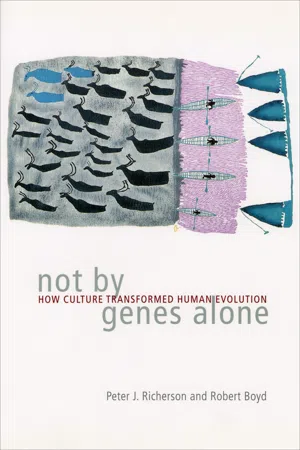
- English
- PDF
- Available on iOS & Android
About This Book
Humans are a striking anomaly in the natural world. While we are similar to other mammals in many ways, our behavior sets us apart. Our unparalleled ability to adapt has allowed us to occupy virtually every habitat on earth using an incredible variety of tools and subsistence techniques. Our societies are larger, more complex, and more cooperative than any other mammal's. In this stunning exploration of human adaptation, Peter J. Richerson and Robert Boyd argue that only a Darwinian theory of cultural evolution can explain these unique characteristics. Not by Genes Alone offers a radical interpretation of human evolution, arguing that our ecological dominance and our singular social systems stem from a psychology uniquely adapted to create complex culture. Richerson and Boyd illustrate here that culture is neither superorganic nor the handmaiden of the genes. Rather, it is essential to human adaptation, as much a part of human biology as bipedal locomotion. Drawing on work in the fields of anthropology, political science, sociology, and economics—and building their case with such fascinating examples as kayaks, corporations, clever knots, and yams that require twelve men to carry them—Richerson and Boyd convincingly demonstrate that culture and biology are inextricably linked, and they show us how to think about their interaction in a way that yields a richer understanding of human nature.In abandoning the nature-versus-nurture debate as fundamentally misconceived, Not by Genes Alone is a truly original and groundbreaking theory of the role of culture in evolution and a book to be reckoned with for generations to come."I continue to be surprised by the number of educated people (many of them biologists) who think that offering explanations for human behavior in terms of culture somehow disproves the suggestion that human behavior can be explained in Darwinian evolutionary terms. Fortunately, we now have a book to which they may be directed for enlightenment.... It is a book full of good sense and the kinds of intellectual rigor and clarity of writing that we have come to expect from the Boyd/Richerson stable."—Robin Dunbar, Nature " Not by Genes Alone is a valuable and very readable synthesis of a still embryonic but very important subject straddling the sciences and humanities."—E. O. Wilson, Harvard University
Frequently asked questions
Information
Table of contents
- Contents
- Acknowledgments
- Chapter 1 Culture Is Essential
- Chapter 2 Culture Exists
- Chapter 3 Culture Evolves
- Chapter 4 Culture Is an Adaptation
- Chapter 5 Culture Is Maladaptive
- Chapter 6 Culture and Genes Coevolve
- Chapter 7 Nothing About Culture Makes Sense Except in the Light of Evolution
- Notes
- References and Author Index
- General Index